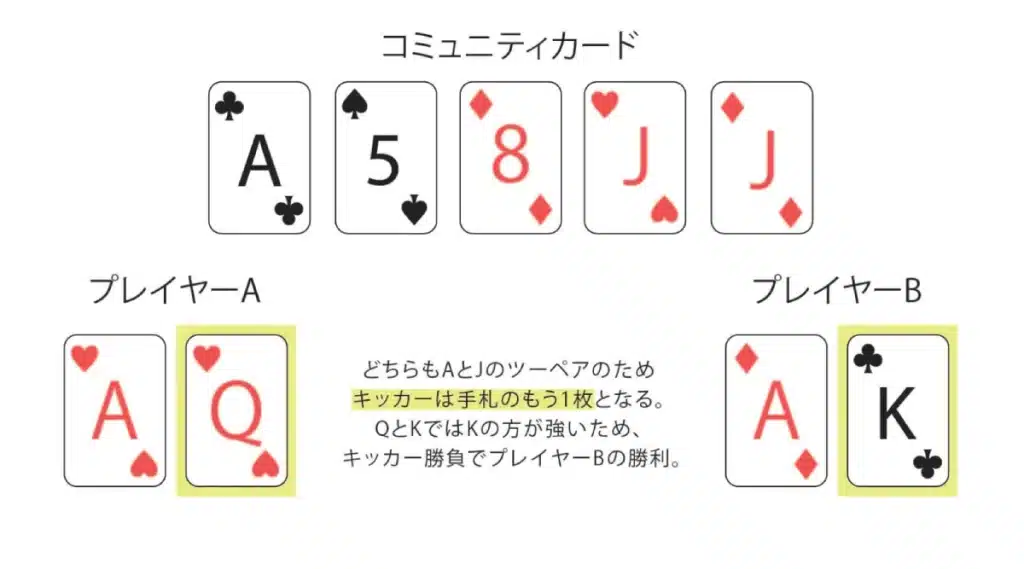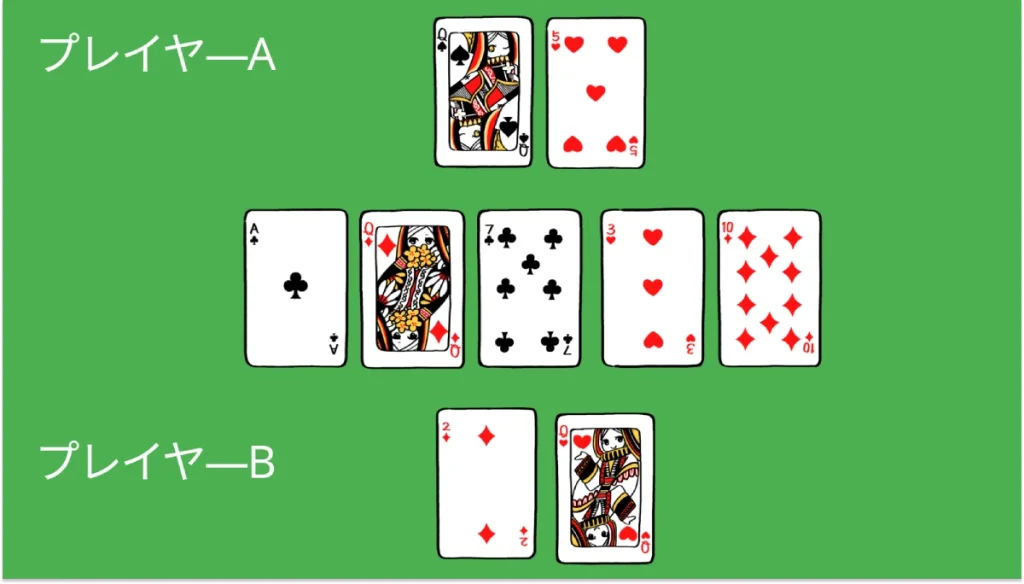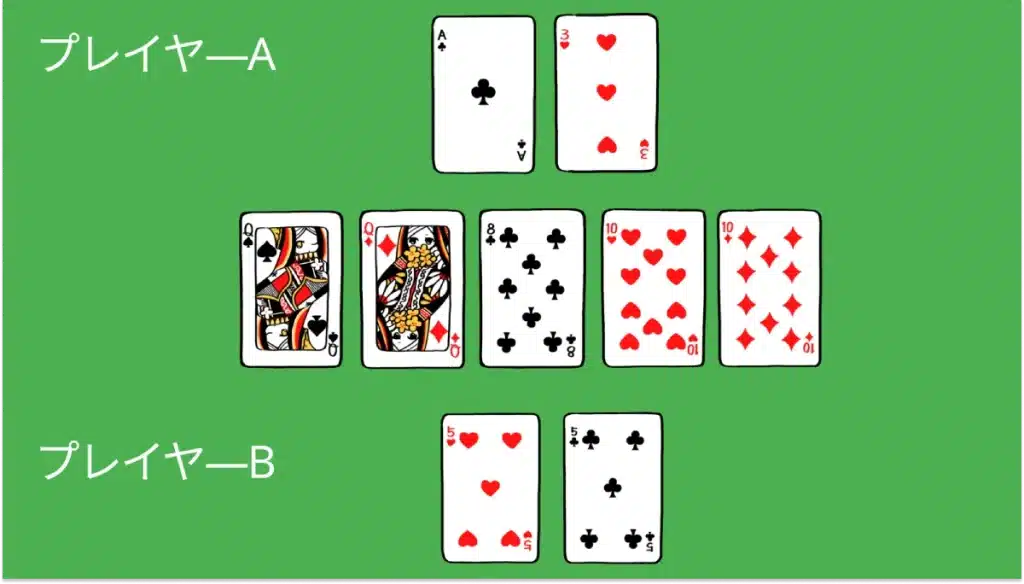Understanding D'Alembert method disadvantages for smarter gameplay The D'Alembert system is one of the most popular betting methods for roulette players who prefer a structured, cautious approach. Its appeal lies in its gradual bet increases, which feel safer than aggressive systems like the Martingale system. However, slow doesn’t always mean safe. Losing streaks, table limits, […]
Poker kicker guide: Learn the key rules before you play
In poker, knowing the rank of your hand is not enough to judge if you will win. A kicker plays a huge role in close hands where two or more players share the same main rank, such as a pair or two pairs.
The poker kicker is the card that steps in to break the tie and decide who holds the stronger hand. If you ignore the kicker, you may overrate your hand and make poor calls. By learning how kickers work, new players can avoid costly errors and read the table with more skill.
What is a poker kicker?
A poker kicker is a side card used to split hands that look the same at first glance. For instance, if two players both have a pair of Kings, the one with the higher side card, say an Ace instead of a Queen, wins the hand.
Kickers matter in many poker variants, from Texas Hold’em to Omaha, and they often decide pots that seem even. In short, a kicker gives weight to your hand beyond its main rank. This is why knowing your kicker is key to smart play and hand reading.
Examples of kickers in poker
A poker kicker match can change the outcome of a hand even when two players seem to hold the same strength. For instance, if you hold Ace-King and your rival has Ace-Queen on a board with no pairs, both of you share an Ace-high hand. However, the King acts as the stronger kicker, giving you the win.
Kickers also play a major role in pairs. If two players both have a pair of Jacks, the higher side card, such as a Queen, will beat a Ten. Even in high-card hands, the kicker is the tie-breaker that makes all the difference.

Poker kicker rules for each hand
Poker kicker rules may sound complex, but they follow a clear logic once you know when they apply. Here's how the rules work for a better poker kicker match:
- In a high-card hand, the kicker is the next card after the highest rank. For instance, if two players both have Ace-high, the second card, say a King versus a Queen, decides the winner. If that also ties, the next card is checked until the hand is settled.
- In one-pair hands, the three side cards can all act as kickers if needed. For instance, if both players hold a pair of Jacks, an Ace kicker beats a King. If the first kicker ties, the second, or the third kicker may be used. This makes one-pair situations kicker-dependent.
- With two-pair hands, the kicker is the single card that does not belong to either pair. Suppose the board shows two Queens and two Nines. If one player holds an Ace and the other holds a Ten, the Ace kicker wins the pot. However, if both hold the same high card, the result is a tie.
- In three-of-a-kind hands, side cards up to two kickers can break ties if both players share the same trips. For instance, if two players both have three Eights, one holding Ace-King will beat another holding Ace-Queen, since the King out kicks the Queen. If both side cards tie, the pot is split.
Overall, the kicker rule is always there to separate hands when the main ranks match. It ensures that the full five-card hand is judged fairly, giving the win to the player with the strongest supporting cards.
When the kicker doesn’t matter
There are times in poker when the kicker has no role at all, leading to what players call a poker kicker loss. This occurs when the cards on the board form the best five-card hand for all players. For example, if the community shows Ace-King-Queen-Jack-Ten, everyone has the same straight, and no kicker can change the outcome.
Shared boards, such as full houses, straights, or flushes, often cancel the kicker advantage. In these spots, knowing the rules helps players avoid overrating a kicker that has no power to decide the winner.
Chop situations
A poker chop kicker moment arises when both players end up with identical five-card hands, no matter what kickers they hold. This is also called a poker kicker draw. For instance, if the board shows King-10-7-5-2 and two players both hold King-Queen and King-Jack, the winning hand is King-high with 10-7-5 from the board.
Since both players share the same five cards, the pot is split evenly. Kickers in these chop cases have no weight, as the board itself decides the result and wipes out any edge.

When two pairs appear on the board
Another time the kicker does not matter is when the board itself shows two pairs plus the fifth card. For instance, if the board runs out with Queens, Jacks, and a Ten, every player has the same two-pair hand with the Ten as the kicker. In this case, the pot will be tied unless someone can make a full house.
However, if the board shows only two pairs and the fifth card must come from a player’s hand, the kicker can still step in. For instance, two pairs on the board with an Ace in one hand and a King in another means the Ace kicker still wins.

Common mistakes with kickers
A poker kicker can be a winning edge, but new players often slip up by misreading its value. These errors lead to lost pots and poor calls, since the kicker does not always behave the way they expect.
Here are some frequent mistakes to watch out for:
- Overvaluing weak kickers - Many new players think holding an Ace with any card is strong. However, an Ace with a weak kicker like a Two or Three typically loses to another Ace with a higher side card. This false sense of power leads to a costly poker kicker loss.
- Assuming the kicker always counts - A common error is to believe that the kicker always decides the outcome. On certain boards, such as straights, flushes, or full houses, the kicker has no effect at all. Ignoring this rule makes players overrate their hand strength.
- Not reading the board texture - Players often forget that the community cards can cancel the kicker. For instance, if the board shows two pairs and a fifth card, the kicker is neutralised. Failing to see this leads to false confidence in side cards that don’t matter.
- Forgetting about chop pots - Some players don’t realise that identical hands result in a split pot. In a poker chop kicker or poker kicker draw, kickers no longer play a role. Thinking they won outright when the pot is shared can be confusing and frustrating.
- Playing dominated hands - Starting with hands like Ace-Ten may look solid, but they often lose to stronger Aces. If an opponent holds Ace-Queen or Ace-King, you are likely outkicked. Not factoring this in leads to repeated small but painful losses.
- Not adjusting for position - Some players don’t realise kickers matter more when out of position. If you bet with a weak top pair, a stronger kicker can punish you when you cannot control the betting. Misjudging this dynamic is a big leak in many players’ games.
- Overplaying one-pair hands - A one-pair hand with a low kicker may look strong, but it’s actually delicate. For instance, a pair of Kings with a weak kicker can still lose to the same pair with an Ace kicker.
- Not planning for tie-breakers - Players often don’t consider how their kicker compares before the showdown. When they finally reveal cards, they are shocked to lose by one small rank. This lack of foresight comes from ignoring how tie-breakers actually work.
- Confusing live cards with kickers - Some mix up the idea of having live cards (cards that can still hit the board) with having a good kicker. A live card doesn’t mean a strong side card, and this confusion often leads to bad reads.
- Failing to fold when outkicked - Many beginners stay in hands they should fold, hoping their kicker will save them. The truth is, a weak kicker rarely rescues a hand against stronger holdings. Failing to accept this reality drains chips over the long run.
Tips to improve with kickers
Now that you know the answer to ‘what is a poker kicker?’, learn how to use kickers the right way to avert many avoidable errors. By focusing on board reading and hand strength, you can reduce costly mistakes linked to side cards.
Here are some strategies to sharpen your kicker play:
- Study the board texture carefully - Always look at the full board before judging your kicker. If the board shows a straight, flush, or full house, your kicker likely has no effect. This habit helps avoid false hope.
- Compare kickers before showdown - Train yourself to think one step ahead. Ask yourself, 'If my rival also has a top pair, is my kicker strong enough?' This mindset prepares you for tie-breakers before they happen.
- Avoid weak Ace hands - Hands like Ace-Two or Ace-Five are often dominated by stronger Aces. Folding them in early spots saves chips and avoids a classic poker kicker loss. Select stronger Aces with higher kickers when possible.
- Value position more with weak kickers - If you hold a hand with a low kicker, being in position gives you more control. You can check behind or fold without losing extra chips. This reduces the risk of being trapped by stronger kickers.
- Don’t overplay one pair - Respect the fact that one-pair hands are often beaten by the same pair with better kickers. Play them with care, and avoid putting all your chips in unless the kicker is strong.
- Learn from chop pots - Use poker chop kicker and poker kicker draw situations to learn how boards can cancel kicker edges. The more you see these spots, the easier it becomes to read them in real time.
- Review common kicker spots - Go over hand histories where you lost with weak kickers. Spotting patterns helps you adjust future play. This self-study makes you sharper with hand evaluation.
- Favour suited connectors in some spots - Instead of chasing weak top-pair hands with bad kickers, play hands like 9-10 suited. These give more ways to win beyond kicker battles, reducing the risk of being outkicked.
- Adjust hand ranges by table type - In loose games, stronger kickers are even more important. In tighter games, you can get away with playing weaker ones. Matching your kicker awareness to the table style avoids costly slips.
- Stay calm when losing to a kicker - Everyone has lost to a stronger kicker, and it’s part of the game. Don’t tilt when it happens. Use the hand as a lesson to improve your reading and hand selection.
Balance the table, gamble responsibly
Poker is best enjoyed with balance, and being responsible makes the game both safe and fun. You should take steps to protect your well-being while enjoying the challenge of poker.
Here are some key habits to follow:
- Setting limits - Decide how much time and money you will spend before starting, and stick to it regardless of the outcome. Limits protect you from chasing losses and help you stay in control. This creates a safer and more fun poker experience.
- Taking breaks - Step away from the game from time to time to clear your mind. Breaks help reduce stress, keep your focus sharp, and prevent poor choices made out of fatigue. Having a rested mind helps you make better decisions.
- Keeping poker enjoyable in the long run - Treat poker as entertainment, not a way to earn quick cash. Focus on learning and enjoying the process rather than only the result. This approach keeps the game fun and rewarding.
- Avoiding tilt - Losing with a kicker or to bad luck is part of poker. Don’t let emotions guide your next move, as tilt often leads to reckless bets. Stay calm, and remember that each hand is just one part of the bigger game.
- Balancing poker with daily life - Ensure poker does not replace other important parts of your routine. Keeping a healthy balance with work, family, and hobbies ensures the game stays positive. Poker should add fun, not stress, to your lifestyle.
Enhance your poker strategy with kickers at Bitcasino
A strong Bitcasino poker strategy goes beyond knowing the rank of your cards, it includes mastering the use of kickers. Kickers are the side cards that often decide who wins when two hands look the same. By learning when a kicker counts and when it does not, players can sharpen their reads and avoid costly mistakes.
A deep understanding of kickers helps with smarter hand selection, better board analysis, and more sound decision-making at the table. With practice, kickers become a vital tool in shaping a clearer plan and building confidence in every set of the game.
Frequently Asked Questions (FAQ)
Poker kickers often raise questions for new players, since they can be both simple and tricky at the same time. Here are answers to some of the most common concerns to help clear up how kickers work:
Can the kicker change the outcome in a split pot?
No, if both players have the same five-card hand, the pot is split evenly. In this case, the kicker has no power to decide the winner.
Can kickers affect tournament strategy?
Yes, knowing kicker strength can shape your decisions in tournaments. Folding weak kickers early can help you save chips and last longer.
How to avoid losing with a weak kicker?
Choose stronger starting hands and fold dominated ones like Ace-Three when facing action. Being selective reduces the risk of being outkicked.
What is the difference between a pair and the kicker?
The pair is your main hand rank, while the kicker is the side card used to break ties. For instance, a pair of Kings with an Ace kicker beats the same pair with a Queen kicker.
Can kickers be used to bluff?
Not directly, since the kicker only counts at showdown. However, you can bluff by representing a stronger kicker through betting patterns.
How to determine if a kicker wins?
Compare the best five-card hands between players. If the main rank ties, the higher side card decides the outcome.
Do kickers matter in flushes and straights?
No, in flushes and straights, the five cards form the complete hand. Kickers have no role in these cases.
Can two kickers be used in the same hand?
Yes, in three-of-a-kind hands, up to two kickers can be used. These side cards decide the winner if players share the same trips.
Why are kickers so important in Texas Hold’em?
Since players often share parts of the board, kickers are the deciding factor in many pots. Ignoring them leads to misreads and costly mistakes.
Can the board itself act as a kicker?
Yes, if the fifth card on the board completes the best hand for everyone. In such cases, the kicker comes from the board, not a player’s hand.

Actual payout amounts will vary depending on the currency you use.















